Please Take Note: This is a review of the game’s final prototype. The art, game bits, and the rules discussed are all subject to change. The game is being reviewed on the components and the rules provided with the understanding that “what you see is not what you might get” when the game is published. If you like what you read and want to learn more, we encourage you to visit the game’s web page or visit the Kickstarter project page to back it and get yourself a copy! Now that we have all that disclaimer junk out of the way, on with the review!
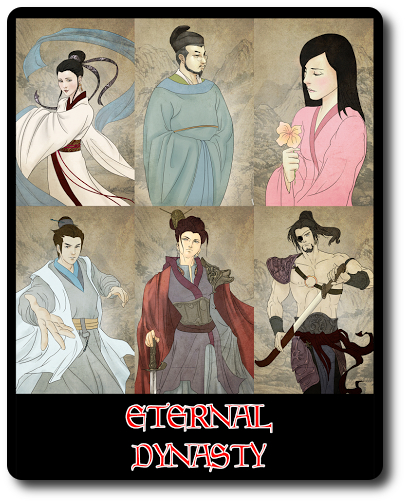
The Basics:
- For ages 9 and up (publisher suggests 13+)
- For 3 to 5 players
- Approximately 90 minutes to complete
Geek Skills:
- Active Listening & Communication
- Counting & Math
- Logical & Critical Decision Making
- Reading
- Pattern/Color Matching
- Strategy & Tactics
- Risk vs. Reward
- Hand/Resource Management
- Bluffing and Misdirection
- Voting
- Worker Placement & Area Control
Learning Curve:
- Child – Moderate
- Adult – Easy
Theme & Narrative:
- Gain power and influence, one generation at a time
Endorsements:
- Gamer Geek approved!
- Parent Geek mixed!
- Child Geek rejected!
Overview
To obtain power, one must have influence. To keep power, one must fight for it. From one generation to the next, that which was gained in the past is coveted in the present. The next generation will squabble over the legacy of their parents and power will forever shift. Your clan has great ambition, but power is not easily kept.
Eternal Dynasty, designed by Joshua Reubens, Nicholas Yu, and to be published by Zucchini People Games, will reportedly be comprised of 1 HUGE 22″x 22″ game board, 36 Ruler cards, 89 Dynasty cards, 30 Vote cards, 20 Event cards, 5 Aye cards, 5 Nay cards, 30o Influence tokens, 5 Scoring tokens, 5 Home Province tokens, 10 Leader tokens, 20 Structure tokens, 80 Coin tokens (20 “0-value”, 40 “1-value”, and 20 “2-value”), 1 Coin bag, 4 Event tokens, 2 “3-Player” markers, 1 Turn counter, 1 First Player token, and 1 standard twenty-sided die. As this is a review of a prepublished game, I cannot comment on the game component quality. I can say, however, that the proposed artwork is simply outstanding. Artists Tong Bui, Kendall Goode, and Lea Segarra have created a visual feast for the eyes.
Game Set Up
Note: The following explains the game set up for a 4 or 5-player game. A 3-player game is almost identical except for the removal of 2 Provinces from play. See the Game Variants section below for additional details.
To set up the game, first unfold the game board and put it in the middle of the playing area.
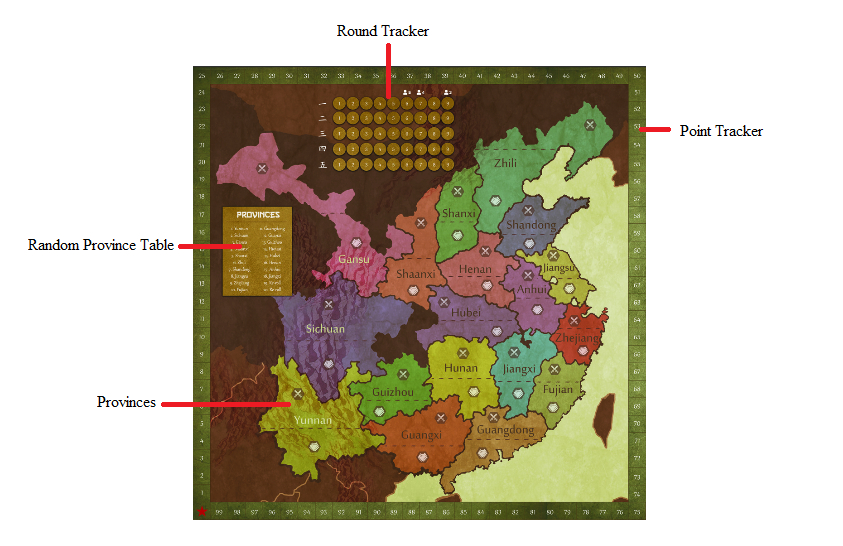
Second, give each player 1 Vote card for every generation in the game. The number of generations is dependent on the number of players.
- 3 Players: 3 Generations
- 4 Players: 4 Generations
- 5 Players: 5 Generations
Third, give each player 1 Aye card and 1 Nay card. Any unused Aye and Nay cards are removed for the duration of the game.
Fourth, place to one side of the game playing area 1 “General” Dynasty card, 1 “Magistrate” Dynasty card, 1 “Fortress” Dynasty card, and 1 “Palace” Dynasty card.
Fifth, shuffle and place face-down the Dynasty cards next to one side of the game board.
Sixth, shuffle the Event cards and place them face-down next to the Dynasty deck.
Seventh, organize the tokens into different piles and set them to one side of the game playing area.
Eighth, place the Coin tokens in the Coin bag and mix them up. Set the Coin bag to one side of the game playing area.
Ninth, give each player a marker to use on the scoring track.
That’s it for game set up. Take the twenty-sided die to determine to who will go first. The player with the highest roll is given the First Player token.
To Rule On High
Note: Eternal Dynasty is not what I would consider to be a difficult game, but each round is resolved differently, despite each round using the same logical breakdown of actions. A typical round is summarized here, but each round is unique in its events and actions.
Eternal Dynasty is played in turns and rounds. The total number of rounds in a game is dependent on the number of players in the game.
- 3 Generations (3-player game) = 9 Rounds per Generation (27 turns total)
- 4 Generations (4-player game) = 7 Rounds per Generation (28 turns total)
- 5 Generations (5-player game) = 6 Rounds per Generation (30 turns total)
Each round is broken down into specific phases. These phases are summarized here.
Event Phase
This phase only occurs after the first round of play. If players have kept any Event cards, they can now play them in turn order sequence and resolve them one at a time. Only one Event card can be played at a time and, unless otherwise specified, there is no limit to the number of “Minor” Event cards that can be played. Once a “Major” Event card is played, this phase ends after the event has been resolved.
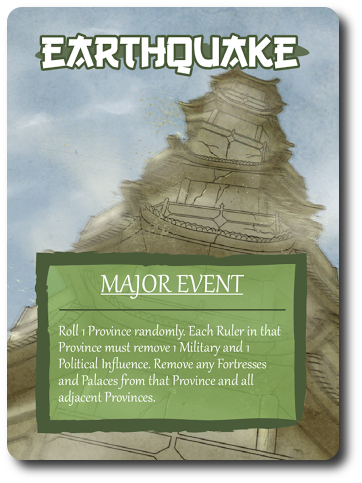
Draw Cards Phase
Each player is now dealt 6 Dynasty cards and 3 Ruler cards. The players look through and select 1 Ruler card, discarding the other 2. This is the player’s ruler for the generation. Each ruler has their own special skills and abilities. Some are better at military and some at politics. Each Ruler card will list a special ability, bonus military might, and bonus political prowess. These are kept by the Ruler card. Each player is also given 2 Military tokens and 2 Political tokens to add to the ruler’s Home Province.
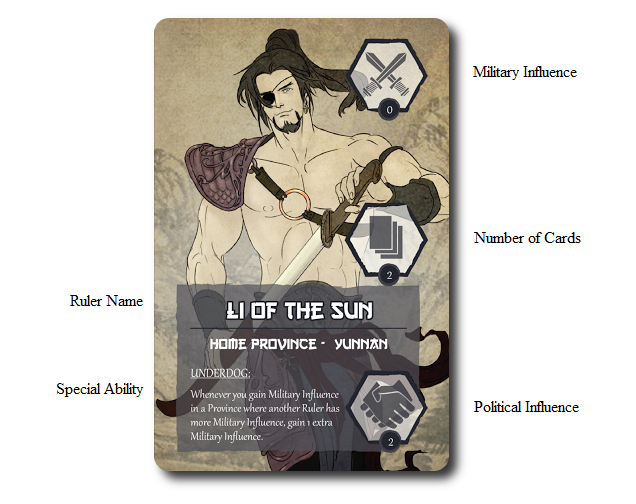
Players now discard down to the number of cards allowed by the Ruler card they selected. Any cards discarded are placed in the discard pile. Once completed, each player should activate any “After Ruler is Chosen” special abilities and resolve in turn order sequence.
Play Phase
Staring with the First Player and continuing in turn order sequence, each player will select 1 of the following actions on their turn.
- Place 1 Military or 1 Political token in an adjacent Province that they already have influence in. These tokens are taken from their Ruler cards and added to either the Military or Political side of the Province or moved from the Province.
- Play a card from their hand and resolve
When a player gains influence, the player may elect to use some or all of their bonus influence. If a player is ever forced to remove influence, they must do so and remove as much as possible of the type identified to comply to the effect.
If players use Magistrates and Generals, only 1 of each can ever occupy the same Province for each player. Multiple Magistrates and Generals may occupy the same Province as long as they belong to different players. The same goes for Palaces and Fortresses.
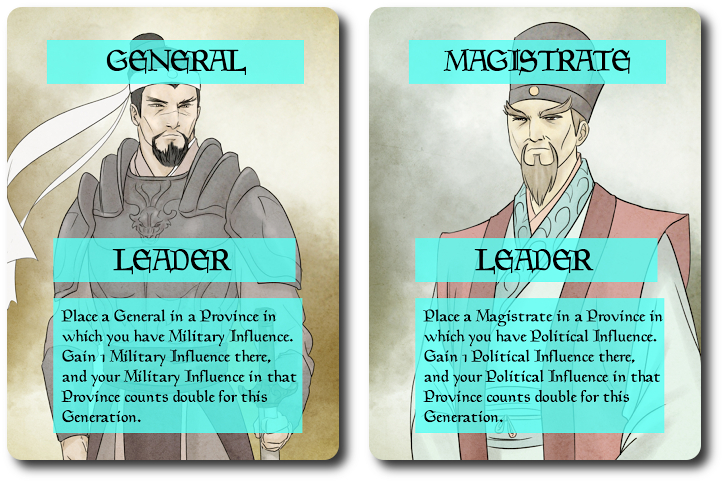
At anytime during the player’s turn, but before they activate a “Start of turn” ruler special ability, they may play a Vote card. Players can only play 1 Vote card per generation. The Vote card is read out-loud and all the players secretly select and place face-down an “Aye” (voting for) or a “Nay” (voting against). The cards are then revealed and players may now add any remaining Vote cards they might have to add more “Aye’s” and “Nay’s” in hopes of tipping the vote. When everyone is done adding Vote cards, the vote is tallied and the originally played Vote card is resolved starting with the player who initiated the vote and continuing in clockwise order. Vote cards used are discarded, but the Aye an Nay cards are returned to their owning player.
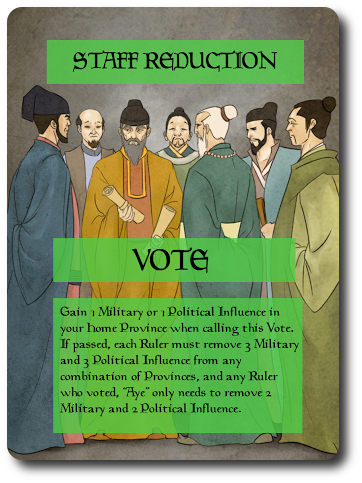
When all the players have had a turn, a new turn beings with the Play Phase repeating. This continues until all the turns are completed. Any cards played during a round are sent to the discard pile. Dynasty cards influence military might, slant political objectives, create alliances, and shift the power base among the players.
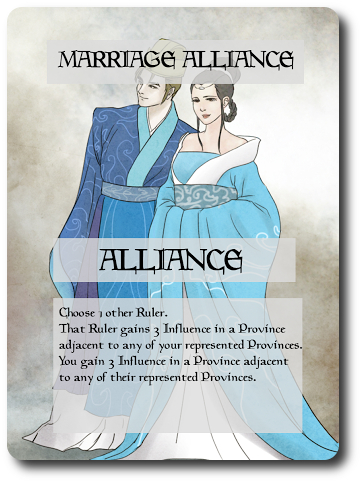
Rounds ant turns are kept track of using the Round Track found on the game board. Again, the number of rounds is determined by the number of players.
Scoring Phase
After the round ends, points are counted and tracked using the Score track that surrounds the border of the game board.
- +2 points to the player who has the most Military influence
- +1 point to the player who has the second most Military influence
- +2 points to the player who has the most Political influence
- +1 point to the player who has the second most Political influence
- 1 Coin is awarded to a player if they have the most Military and Political influence
- Fortresses give +3 points to the player who has the most Military influence in the Province
- Palaces give +3 points to the player who has the most Political influence in the Province
- Bonus Coins for any Event cards that award them
Coins are drawn from the bag and kept face-down in front of the player until the end of the game. Coins have points that range from +0 to +2 .
Clean Up Phase
The Ruler cards are discarded and a new round begins as stated above.
Winning the Game
After the last round, the points are again added. The player with the most total points, including Coins, at the end wins the game. Their line will continue to rule, generation after generation.
Game Variants
Several game variants are provided which allows players to change the difficulty and complexity of the game. They are summarized here.
3-Player Set Up
The game set up described above is for a 4 to 5-player game. When playing with only 3-players, the game is set up the same except 2 Provinces from the game board are removed from play. Which 2 are determined by a roll of the twenty-sided die. For the duration of the game, players cannot access these Provinces.
Longer 3-Player Game
A 3-player game of Eternal Dynasty could be over sooner than the players like. This game variant lengthens the game play by adding in a fourth generation to play instead of just 3.
No Events
This game variant removes the random events that can cause havoc and dramatically shift the power in the game. By reducing the randomness, Eternal Dynasty becomes a much more strategic and tactical game. This game variant also reduces the total play time.
No Coins
This game variant removes the Coin tokens from play. Whenever a player would receive a Coin token, they instead gain 1 point. This removes the random and obscure “possible points” during the game, making it much easier for players to determine the points earned so far by their opponents.
Ruler Draft
This game variant has the players draft the Ruler cards. Each player is dealt 3 during each generation as normal, but each player picks 1 and passes 2 to the left. They then pick 1 of the 2 and pass their last card to the left. Each player now has 3 Ruler cards and from these they pick 1 to play. During the next generation, the cards are passes in the opposite direction.
To learn more about Eternal Dynasty, visit the game’s web page or visit the Kickstarter project page
Prediction
Eternal Dynasty is an interesting mix of rules and game mechanisms that would appear to be bits and pieces of other games. All of which are easy to understand and should be familiar to some of our Child Geeks and to all of our Parent and Gamer Geeks. What has me concerned for the Child Geeks is the constant change. Child Geeks learn games often through repetition. While each game turn might be different, the flow of each round is the same which allows the Child Geeks to start picking up on patterns and connecting outcomes to actions. The same could be said for Eternal Dynasty, except that each round introduces brand new rules and abilities. Each of which is always tethered to a very straight-forward and well structured round phase breakdown, but the shifting might prove to be too confusing to our Child Geeks.
For our Parent Geeks, I think we’ll see a mixed response. Eternal Dynasty is not a casual game and its overall game play length might turn some of the Parent Geeks away. The Gamer Geeks should have no problems with Eternal Dynasty and enjoy themselves a great deal, unless there proves to be something negative about the game I am unaware of and will only observe while it’s being played.
Teaching Eternal Dynasty should be done in two parts. The first is a summary of a round, detailing each phase, and explaining how players move around the Provinces. The second is going to take you a bit longer. I suggest you demonstrate how each round is different based on the Ruler card that is selected and how the game board changes after every generation. It’s imperative that the players understand that they must have they eyes focused on the present, but their mind thinking about future plays. Note that Eternal Dynasty does require it’s players to be able to read, meaning younger Child Geeks who want to play should team up with a Parent Geek or an older sibling.
After teaching Eternal Dynasty to my oldest Child Geek, I asked him his thoughts on the game so far.
“Really neat idea! I like how I get to play lots of different characters in a single game!” ~ Liam (age 9)
Yes, I’m excited about that, too. Each new generation brings to the table new opportunities and new challenges. I like games like that because they keep me focused and entertained. Let’s see if Eternal Dynasty delivers an engaging gaming experience or bitterly disappoints.
Final Word
The older Child Geeks understood how to play the game, but only the most experienced of the Child Geeks could play it. Eternal Dynasty is an interesting mix of individual game mechanisms and rules that are very easy to understand. When put together, they become much more complex. This is because there is no visible connection between cause and effect until the end of the generation. In this way, players must really think through their Ruler, Event, and Dynasty card selection. Each round is an opportunity to build upon the last. This was just too much for all but the most skilled of our Child Geeks to grasp. All of our Child Geeks could play the game, but it was clear that only a few of them understood it well enough to make meaningful decisions. According to one Child Geek who did not like the game, “I understand what I can do, but I don’t understand when I should do it or why it makes any difference.” A Child Geek who enjoyed the game said, “I like it because it reminds me a little bit of Chess. I have to think ahead.” When the votes were cast, only a few of the Child Geeks voted to approve it, with the majority deciding it just wasn’t a game for them.
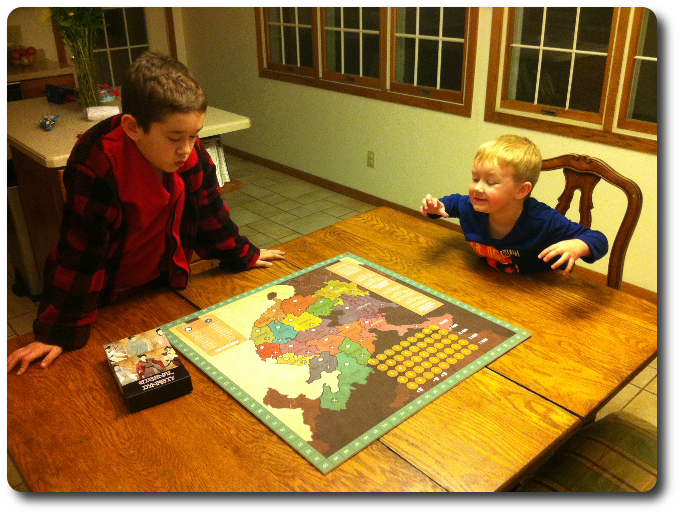
My oldest explains the game to his younger brother while we wait for more players to arrive
The Parent Geeks were an interesting study. Like the Child Geeks, they all understood how the game was to be played and like the Child Geeks, it was clear that some of the Parent Geeks became lost in the complexity that comes with undefined limits. Eternal Dynasty gives a lot of control to the players. So much, in fact, it was difficult for the more casual and non-gamer Parent Geeks to “connect the dots” with the cards and what they were hoping to accomplish every round. If each round and generation was the same, I doubt the confusion would even exist. However, each generation in Eternal Dynasty is different which means players must adapt to subtle shifts in their tactics each round and face new obstacles presented by their opponents. According to one Parent Geek who wasn’t having such a good time, “I get the game, I really do, but I just can’t seem to find stable ground. I keep feeling like everything is shifting out from underneath me every round, which is really disheartening.” Very true! Every round is the same in structure, but very different in game play. According to a Parent Geek who enjoyed it (a lot), “Wow! This is just – wow – what a neat game! I mean, it feels like a different game during each generation, but I really like that! I feel like I’m playing a board game that has the same complexity as a real-time strategy game on the computer!” When all the games were done and the votes tallied, the Parent Geeks were split. Those Parent Geeks who enjoyed games that were more complex had a lot of fun, while the Parent Geeks who were only looking for casual games they could play with their family decided to reject Eternal Dynasty.
The Gamer Geeks ate Eternal Dynasty up like it was covered in chocolate. They immediately understood how to play the game and played it like masters. It only took 1 round for the Gamer Geeks to understand the game’s complexity and they spent the rest of the time attempting to outwit their opponents. Perhaps the most intriguing aspect of the game for the Gamer Geeks was the voting. According to one Gamer Geek, “The voting is a like a meta game – a game within the game. I really like that, because it allows me to shift the game in neat ways towards my own goals.” Surprisingly, the Gamer Geeks didn’t much care for the Event cards, finding them to be too random, causing more confusion and delay rather than fun and complexity. One Gamer Geek said, “The only part about this game I don’t like is the random events that hit the board. It’s fine, I suppose, but everything else about the game makes the players plan, prep, and execute. Then – BAM! – a random event takes out an entire Province. That kind of sucks.” All the Gamer Geeks voted to approve the game, despite some of the random events getting in the way from time to time.
Eternal Dynasty was a lot of fun for me to play as a Gamer Geek, but a real chore as a Parent Geek. As a Gamer Geek, I very much enjoyed the ever-shifting tactics and strategy I had to use during each generation, the aggressive military and political area control of the Provinces, and the cold calculation of the votes. Every game was full of tough choices, fun events, and memorable moments. As a Parent Geek, I spent most of my time being bored. Players took too long to make choices, moved into spot that just didn’t make sense, and I got the feeling that many of the Child and the Parent Geeks were just going through the motions instead of actually thinking things through.
Despite its very easy game play, this is not an intuitive game. There is a lot to consider and players will soon see that the round they are currently playing is nothing more than a set up for what could be for their next round. I found this to be fascinating, while many others simply found it confusing. While I do not consider Eternal Dynasty to be a “gateway game”, I do think it’s the “next step” after players have experienced games like Risk or Ticket to Ride and no longer feel challenged. Again, the rules are simple and any player who has played “gateway games” will have little difficulty jumping in, as was observed while playing with our more experienced Child Geeks and Parent Geeks. But jumping in is the easy part, much like it’s easy to jump into an ice-cold pond, but staying in and enjoying it is an entirely different affair. Regardless, Eternal Dynasty is well worth the jump. It’s a game I hope to play again when the younger geek generation is ready to tackle it at our family gaming table.
This is a paid for review of the game’s final prototype. Although our time and focus was financially compensated, our words are our own. We’d need at least 10 million dollars before we started saying what other people wanted. Such is the statuesque and legendary integrity of Father Geek which cannot be bought except by those who own their own private islands and small countries.


Thanks for the extremely thorough write-up, Cyrus. Always a pleasure!
Thanks for the opportunity to play your game! Good luck on your Kickstarter campaign!
In your second last paragraph, that word in “rememberable moments” should be ‘memorable’!
Correct! Poor grammar on my part. Thank you very much for pointing it out. I have corrected the article accordingly.
Pingback: Today in Board Games Issue #123 -Sails of Glory - Today in Board Games